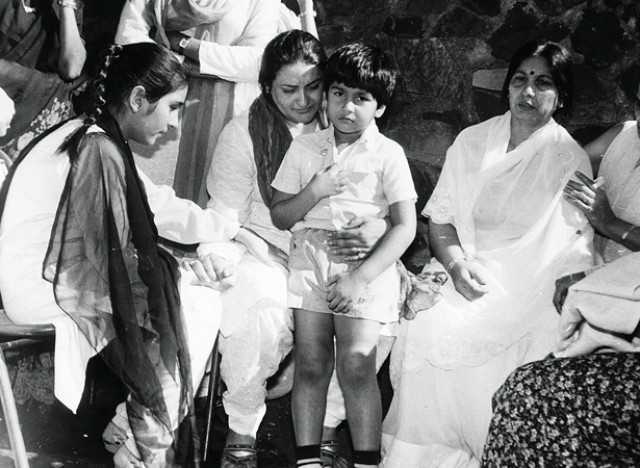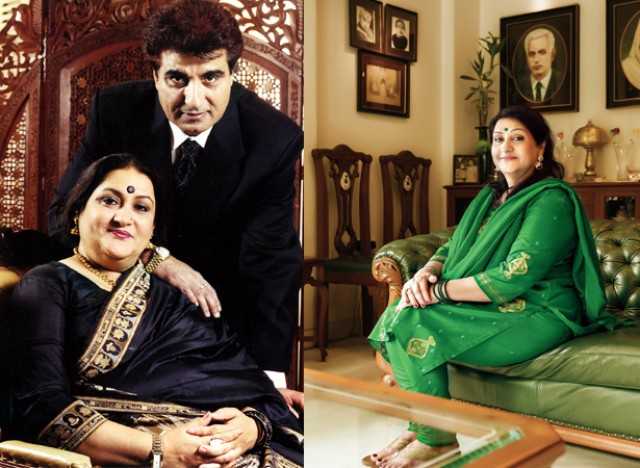She is replete with Lucknowi adas and accent. And dollops of old world tehzeeb and tameez. Yet there’s a candour in the way she has conducted her life and carved her identity away from the razzmatazz of a star husband. As founder of Ekjute (1981), Nadira Babbar has contributed greatly to keeping theatre alive. The actor/playwright /director believes she could well be dubbed as the Bimal Roy and Guru Dutt of Indian theatre for blending message with entertainment.
In her personal life too, she has endured many an upheaval. Her husband, actor/politician Raj Babbar’s second marriage to the late Smita Patil being a turbulent phase. But she didn’t lose focus of her life courtesy theatre and her children – Juhi and Aarya Babbar. And of course her sense of humour. “I’m a joker. Even Raj says kya zaroori hai har jagah comment marna!” she laughs.
On a serious note, she translates a couplet by Faiz Ahmed Faiz, “The flamboyance with which we go to the battlefield is more important than the fact whether we survive or not.” And that’s how this winner of the Sangeet Natak Akademi Award has lived her life. Head on.
Today, the 60 plus Nadira is enjoying a tranquil phase. After being seen in films like Bride And Prejudice and Meenaxi: A Tale of Three Cities, she’ll be playing mother to Salman Khan in Mental. At home, she’s been promoted to playing grandmother to little Imaan (daughter Juhi’s and Anoop Soni’s son). “Imaan hamari jaan hai. I tell Juhi you can have another, give him to me. He’s a supersonic baby,” she says her laughter resonating.
LUCKNOW LIBERALIST
When renowned writer/ Marxist Syed Sajjad Zaheer brought home his young bride from Ajmer to hometown Lucknow, he urged the shy Razia to leave her ornate burqa behind in the railway compartment. “Abba told Ammi, ‘Ussey bas wahin choddh do!’ Ammi pleaded, saying she’d die without it. But he insisted and slipped his hand in hers. He was a true Marxist. We witnessed such comradeship between my parents even though my mother was largely the breadwinner (Razia was a writer/professor),” says Nadira Zaheer Babbar giving an insight into her egalitarian childhood. “That a woman could be ill-treated and disrespected was something unheard of.” She continues, “Abba had studied at the Oxford University but refused to practise law because he couldn’t ‘lie’,” she says of her father who returned to form the Progressive Writers’ Association. The family lived in a section of the palatial Vazir Manzil in Lucknow, which hosted Leftist conferences and witnessed the presence of writers like Kaifi Azmi and Ismat Chugtai.
THE RIGHT ACT
The third among four sisters, Nadira wasn’t a good student unlike her siblings. When the family moved to Delhi in 1967-68, she was to do Library Science when a chance meeting of Sajjad Zaheer with legendary director theatre Ebrahim Alkazi, head of the National School of Drama (NSD), pushed her towards theatre. The initially befuddled Nadira soon found her bearings and went on to bag a gold medal at the institute. “My claim to fame in Delhi was the play Teen Paise Ka Tamasha (adaptation of Bertolt Brecht’s play The Three Penny Opera). Critics loved my performance,” she smiles.
IN HIS RAJ
Nadira met Raj Babbar in NSD in 1975. While he was a student, she was already a professional actor/director. “Within five months of courtship, we got married,” she says of their romance, which had kindled during their play Jasma Odan. “We didn’t have a house, so we lived in the one granted to my mother by the government. Our daughter Juhi was born in 1976. We faced several hardships. But the struggle helped us evolve,” she recalls. Around 1978, Raj came to Mumbai and signed a couple of films.
“I followed him here. But
I didn’t want to work. I had worked hard, travelled far to direct and act in plays for survival. Also,
I had a child. Mera figure bhi itna achcha nahin tha. I didn’t have a 24-26 inch waist. Where were married actresses getting good roles then?” she smiles.
Nadira with children Juhi and Aarya at Smita's funeral
BIRTH OF EKJUTE
When Raj found stardom with hit films including Insaaf Ka Tarazu, Nikaah and Aaj Ki Aawaz, it inspired their fellow actors in Delhi to try their luck in Mumbai. “On their insistence, Ekjute was formed, of course with Raj’s money. Actors right from Anupam Kher, Kirron Kher, Anita Kanwar, Kavita Chaudhary, Satish Kaushik and others eventually became part of it.” Over the last 30 years, Ekjute has staged 60 plays including Sandhya Chhaya, Look Back in Anger and Begum Jaan. Nadira has also written/directed plays like Dayashankar Ki Diary, Sakku Bai and Ji Jaisi Aapki Marzi. “I’ve maintained the balance between profundity and entertainment. May be, I’m like the Guru Dutt and Bimal Roy of theatre. I have never resorted to chichorapan (vulgarity). I never sacrificed the message for the sake of entertainment.” The Ekjute workshops are conducted for a nominal fee. “The course lasts for a month and includes a four-hour session every day. I’m part of every lecture.”
TOUGH TIMES
During the ’80s, her world was changing in another sense too, her husband’s popularity being on the rise. “I was not used to this kind of attention. I enjoy doing simple things like going to the market. I enjoy bargaining with the machchiwali. But it would be like, ‘Dekho Raj Babbar ki biwi aloo khareed rahi hai’!” she laughs. “Then he went away from us, from his family...” she says softly referring to Raj’s second marriage to the late actor Smita Patil in the early ‘80s. When asked what made her hold on to a crumbling marriage she quotes the native wisdom of her mother, “Suni thi toh dari thi (when I heard about it happening to someone else, I was scared), padi thi toh sahi thi (but when it fell upon me, I had no choice but to endure it). Time, however good or bad, passes. It was fortunate that I didn’t listen to anyone’s advice ke kisi aur mard ke baare mein sochoon (look towards someone else). Theatre and my children helped me hold myself. I grew protective towards my children, more so towards Aarya who was very young. Juhi had somewhere experienced a beautiful time with us. Being overprotective is harmful…,” she rues adding, “But what made me stay on was the fact that Raj is a beautiful human being, caring and sensitive. He never turned away from his responsibilities – even throught difficult times.”
FORGIVE N’ FORGET
It cannot be denied that one of the tragedies that the industry will never be able to live down is the untimely passing away of Smita. The internationally recognised actor, just 31, died on December 13, 1986 due to childbirth complications leaving behind an 11-day-old Prateik. “I don’t want to rake up old issues. Prateik’s nani (maternal grandmother Vidyatai Patil) is very old. I don’t want to hurt anyone,” she says when asked to comment on Smita. Though she does confide being devastated at her sudden death. “I was ridiculed for going to her place (after Smita’s demise). Mujhe bahut afsos, bahut taqleef hui thi for her mother, her family, for the child... She (Smita) had her dreams and wishes. It’s sad she couldn’t live those. The grief of her passing away became larger than any other sorrow. It left everyone broken. It broke us all – Raj, Prateik, her parents and somewhere me too... It was a bad time,” she recalls. “I have forgiven it all. I have no ill feelings towards anyone. In comparison to all that life has blessed me with, it’s not right to complain. You never know who will no longer be there with you...” Her affection for Prateik is apparent when she says, “Prateik is a very good boy. He loves his father very much. Loves me as well. He’s a little unsettled because of his work. But he will settle eventually. Aarya too has now begun doing Punjabi films. Each one has his own climb, his own pitfalls. Prateik visited us on Eid. He didn’t eat anything though because he’s on a diet.”
With husband Raj Babbar
RETORT TO FEMINISTS
Going back in time, soon after Smita’s passing away, when Nadira ‘welcomed’ Raj back, there was a huge outcry from feminists who dubbed her as a doormat. “Doormat? Rubbish!” she retorts. “I’d like to tell them it’s better to be a doormat if you have children. It’s better to be a doormat and have harmony at home and give your children a father. It’s better to be doormat than to think of only yourself, destroy your home, your family and make your children drug addicts or push them towards alcoholism... God forgive me, I’m not taunting anyone!” she clarifies adding, “My children have never touched a cigarette. They have grown up with tradition and values.” She vents further, “Rather than dwelling on ‘my hurt’, ‘my identity’ the thought should be who will feed your children, where will they stay? You are a mother first. You may remarry; you may have children through the other man and both of you may love them. But what about your first children? Are they from a free fund? Don’t I have a responsibility towards them?” She adds, “At the same time, I’m not a woman who will take off my husband’s shoes and press his feet.”
EQUAL PARTNERSHIP
Her relationship with Raj has evolved. Rather they form a ‘mutual criticism’ society. “Raj is a huge critic of my work – more so of my writing. If it’s not good, aisi dhajjiyan udate hain (he shreds me to bits)! I get angry, cry and we have huge fights. But eventually I realise he’s right. I too criticise him. But it has to be gentle. Every actor has an ego.”
She values the sense of security he has given her. “Not once did I feel, apart from those few years, emotionally insecure. It has nothing to do with physicality but with the knowledge that someone’s there for me, a sort of a father figure. He’s my ruhani taakat (spiritual strength). He has upheld my respect, my dignity. I’m standing on the platform he has provided me.” She smiles and says, “Now that we’re both growing old, I tell him, “Mere se pehle mat jaana... nahin seh paaongee (don’t go before me, I’ll not be able to bear it).” But her smile cannot hide the brimming tears.